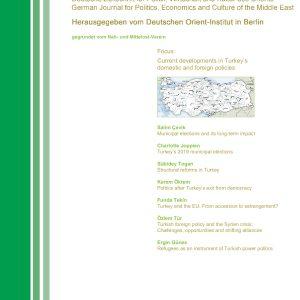Shop
Showing 225–240 of 331 resultsSorted by latest
-

Locating the Uzbek narrative of social justice within the Afghan Taliban movement’s political culture
7,90 €incl. VAT
Add to basket -

Politics after Turkey’s exit from democracy
7,90 €incl. VAT
Add to basket -

Structural reforms in Turkey
7,90 €incl. VAT
Add to basket -

Turkey’s 2019 municipal elections
7,90 €incl. VAT
Add to basket -

Orient III 2019
26,00 €incl. VAT
plus Shipping Costs
Select options This product has multiple variants. The options may be chosen on the product page -

Municipal elections and its long-term impacts
7,90 €incl. VAT
Add to basket -

Refugees as an instrument of Turkish power politics
7,90 €incl. VAT
Add to basket -

Key factors of instability in Libya
7,90 €incl. VAT
Add to basket -

Turkish foreign policy and the Syrian crisis: Challenges, opportunities and shifting alliances
7,90 €incl. VAT
Add to basket -

Turkey and the EU: From accession to estrangement?
7,90 €incl. VAT
Add to basket -

The state of dis-Union: The EU and Europe in the MENA region since 2011
7,90 €incl. VAT
Add to basket -

Macro analysis of gendered discourse in conflict resolution in MENA
7,90 €incl. VAT
Add to basket -

Mitigating MENA communitarian conflicts through power-sharing options
7,90 €incl. VAT
Add to basket -

Conflict resolution in Libya: What works?
7,90 €incl. VAT
Add to basket -

Yemen’s nested conflict(s): Layers, geographies and feuds
7,90 €incl. VAT
Add to basket -

The recent Kurdish struggle
7,90 €incl. VAT
Add to basket


